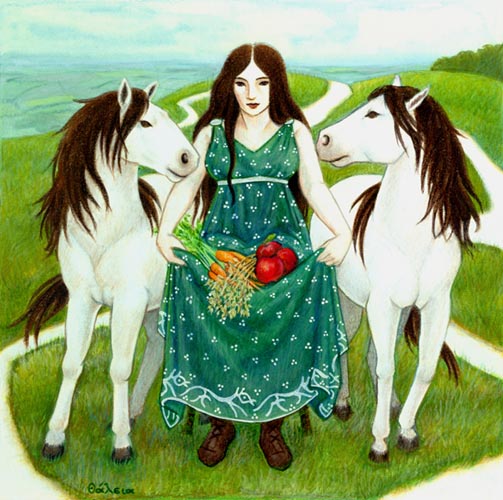The psychologist C G Jung links the Mother archetype with the Horse:
'Mother' is an archetype and refers to the place of origin, to nature … to substance and matter, to materiality and the womb
It also means the unconscious, our natural and instinctive life, the physiological realm, the body in which we dwell
'Horse' is an archetype that is widely current in mythology and folklore. As an animal it represents the non-human psyche, the subhuman, animal side, the unconscious. That is why horses in folklore sometimes see visions, hear voices, and speak. As a beast of burden it is related to the 'mother' archetype
It is evident, then, that 'horse' is an equivalent of 'mother' with a slight shift of meaning.
(from The Practical Use of Dream Analysis)
It also means the unconscious, our natural and instinctive life, the physiological realm, the body in which we dwell
'Horse' is an archetype that is widely current in mythology and folklore. As an animal it represents the non-human psyche, the subhuman, animal side, the unconscious. That is why horses in folklore sometimes see visions, hear voices, and speak. As a beast of burden it is related to the 'mother' archetype
It is evident, then, that 'horse' is an equivalent of 'mother' with a slight shift of meaning.
The identification here with the 'mother' archetype and the 'horse' as a beast of burden has a particular resonance in the context of the passage in the first of the Four Branches of the Mabinogi where Rhiannon takes the role of a beast of burden after being accused of killing her son:
This is the punishment that was put upon her - to be in that court in Arberth until the end of seven years - and there was a mounting block beside the gate - to sit beside that every day, and to tell to all who might come, whom she supposed might not know it, the whole tale; and whoever might allow her to carry him, to offer to carry the guest or stranger on her back to the court. But scarcely would anyone allow her to carry him.
Here, though no-one will take her up on her offer, she has to offer herself for this task that, in the Jungian typology, is linked to motherhood. She has to do this until Teyrnon returns her child to her:
As they approached the court, they could see Rhiannon sitting beside the mounting block. As they came to her, "Ah chieftain", she said "I will carry each of you to the court" ….
"Ah gentle lady" said Teyrnon, "I do not imagine any one of us will go on your back".
[…..]
"And behold there your son, and whoever spoke a lie against you did you wrong".
In Jungian terms, the re-uniting of the mother and child makes things whole so the 'horse' and the 'mother' become an integrated archetype once more and there is no longer a need for one of the elements to be foregrounded as separate from the other.
"Ah gentle lady" said Teyrnon, "I do not imagine any one of us will go on your back".
[…..]
"And behold there your son, and whoever spoke a lie against you did you wrong".

No comments:
Post a Comment